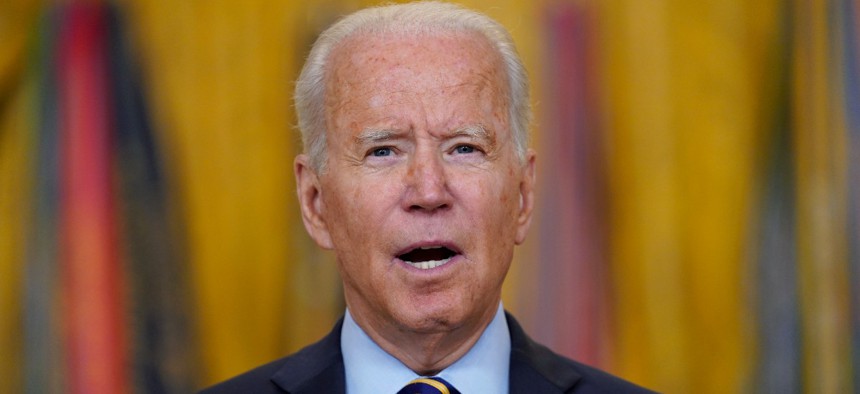Biden Executive Order on Competition Includes ‘Big Tech’

President Joe Biden speaks in the East Room of the White House July 8. Evan Vucci/AP
The executive order includes 72 programs and actions for the administration to take, four of which focus on increasing competition within the technology sector.
The Biden administration issued an executive order with a slew of initiatives designed to increase the competitiveness of American small businesses, crack down on anti-competitive business practices and rein in “Big Tech platforms.”
The “Executive Order on Promoting Competition in the American Economy,” signed Friday, notes that large corporations dominate in three-quarters of U.S. industries, citing statistics from a Swiss Finance Institute research paper.
“That lack of competition drives up prices for consumers,” the administration wrote in a fact sheet distributed ahead of the signing. “As fewer large players have controlled more of the market, mark-ups—charges over cost—have tripled. Families are paying higher prices for necessities—things like prescription drugs, hearing aids and internet service.”
The executive order includes 72 provisions targeting multiple sectors and federal agencies. The list includes technology—or “Big Tech platforms”—and calls on the Federal Trade Commission to take action to ensure the competitiveness of small businesses online and put restrictions on the collection of user data.
The order focuses on four areas of competition among technology companies, particularly those that manage large online platforms: big corporations buying up smaller competition; unfair practices that lock out small businesses; platforms gathering too much personal information on users; and manufacturers limiting third-party access to tools and materials needed to repair devices.
For the first two issues, the administration plans to establish policies that would put “greater scrutiny of mergers, especially by dominant internet platforms,” and would look to address potentially unethical business conduct, such as offering a free product or service to box out smaller competition. The order also asks the FTC to create rules prohibiting large online marketplaces from using data collected about small business users to develop products and services that compete with and eliminate those small businesses.
For the third area, the order again looks to the FTC for action, requesting the commission “establish rules on surveillance and the accumulation of data,” the fact sheet states. The document does not offer any further details on what kinds of data collection would be deemed appropriate or the extent to which it would be allowed.
The order also takes on cell phone manufacturers, which have put restrictions on “the distribution of parts, diagnostics and repair tools,” the fact sheet states, making it harder for consumers and small business repair shops to get the resources needed to make timely and cost-effective repairs.
The order asks the FTC to develop “rules against anticompetitive restrictions” targeted toward shops and device owners.






